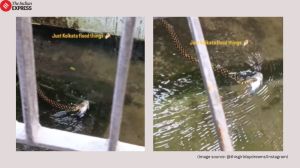4 yrs later, vulture revival plan takes off
Four years after the massive decline in vulture population began, India has taken the first steps towards initiating a vulture recovery plan...

Four years after the massive decline in vulture population began, India has taken the first steps towards initiating a vulture recovery plan.
Despite efforts by researchers, nobody has been able to pinpoint the reason for the mysterious drop in vulture population. The decline is now known to be spreading westwards into Pakistan and bird experts fear that it may spread to other parts of Europe.
Thanks to a Rs 1.1 crore-grant over three years from the Darwin Initiative of the British Government being executed with technical support from the Bombay Natural History Society (BNHS), Mumbai, the first Vulture Care Center in Asia was inaugurated at Pinjore near Chandigarh by visiting British Biodiversity Minister Elliot Morley. Morley says ‘‘the project aims to identify the reasons behind the decline in vulture population and develop corrective measures. This should lead to a recovery plan.’’
The facility, which also has a diagnostic laboratory, houses five vultures and hopes to increase the number to 40 in a few months. The project also hopes to radio-collar five birds to identify their migration patterns and they are using an American satellite, which tracks their movements as they soar over the Eurasian skies. One Himalayan Griffon vulture has been radio-tagged.
Though the number of birds has been declining, sources say the Centre had not been paying any heed to the situation. In fact, for the last three years, the Ministry of Environment and Forests refused to give permission to researchers to even catch the dying birds to identify the causes of the death. When researchers roped in some of the best known bird disease experts, the Government refused permission for the transfer of diseased vulture tissue samples to Britain and Australia.
Andrew Cunningham, an expert on bird diseases from the London Zoo who is with the project, says it was only a few weeks ago that tissue samples from three-four birds were allowed to be taken for analysis to animal disease laboratory in Melbourne.
Preliminary investigations have shown that the most likely cause of the decline in the population is a yet-to-be-identified infectious disease.



- 01
- 02
- 03
- 04
- 05




























